Manufacturers of legal highs must prove that they are safe
In the continuing battle to reduce substance and drug abuse in the UK, the Home Office has announced plans to introduce new legislation that will force manufacturers of legal highs to prove that their drugs are safe.
Today there is a huge variety of designer drugs on the market; over the past year the number of deaths caused by legal highs has doubled.
The new system will require that designer drugs are licensed before they can be sold. Currently manufacturers are able to avoid legislation due to some loopholes in the law, with common tricks including labelling drugs as ‘research chemicals’, ‘plant food’, or even ‘unsuitable for human consumption’.
The biggest problem at the moment is that when the government outlaws a particular substance, manufacturers simply modify the composition slightly and produce it under a different name. By law it is a different drug and is therefore allowed.
New legislation will stop this practice, as all substances will require a specific licence before they can be sold. If the government then decides to ban a substance, the licence is void and a new drug will have to be approved for sale after it has undergone safety tests.
It is likely that the UK will implement similar legislation to that of New Zealand, where a licence is required by all those who make recreational drugs.
The current review is being carried out by Norman Baker, the crime prevention minister, and is expected to be published in spring 2014.
Mr Baker said: “The coalition government is determined to clamp down on the reckless trade in so-called ‘legal highs’, which has tragically already claimed the lives of far too many young people in our country.”
There have been cases of designer drugs containing banned substances being sold through head shops and on the street. Buyers have no way of knowing what the drugs contain or if they are safe.

